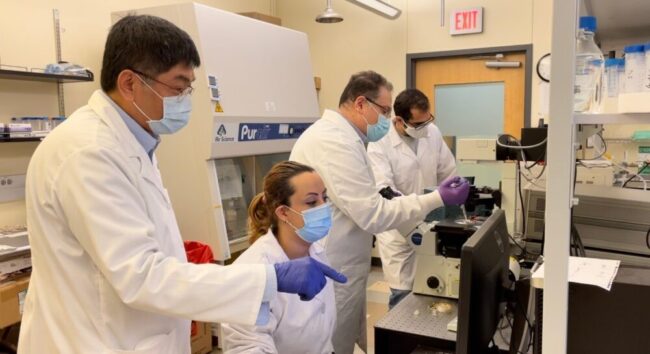Inside a small lab at the SMU Lyle School of Engineering, Karim Manshadi, an SMU Ph.D. student, stands in a clean white lab coat hunched over a microscope.
For as many as eight hours a day, he spends his time in a room filled with the gentle hums of machines and clattering of his keyboard. Although it’s relatively quiet, his work speaks volumes for those fighting COVID-19. Under his microscope is a newly developed antibody test called “Lab on a Chip.”
“This is one of the most interesting projects that I have had the chance to work on because it’s a recent, new field of research, and everyone wants to get a hand in this project,” Manshadi said.
Manshadi is a part of a team of researchers at the SMU Lyle School of Engineering. Dr. Ali Beskok, the Brown Foundation, Inc. Professor of Engineering at SMU’s Lyle School of Engineering, and Dr. J.-C. Chiao, the Mary and Richard Templeton Centennial Chair Professor in the Department of Electrical and Computer Engineering, lead the group. Together, they are developing a new COVID-19 antibody test, “Lab on a Chip,” to better understand the pandemic.
“We want to change the world, and this project [Lab on a Chip] is a perfect demonstration of how we get all the different aspects of expertise together to work on something that is direly in need for our society,” said Dr. Chiao.
The test requires the placement of one drop of blood on a microfluidic chip. After a filter inside the chip extracts the blood’s plasma, it goes into a portal unit that uses electrical measurements to detect IgG, IgM, and IgA antibodies. If the test finds any of those antibodies, it means the person tested has COVID-19 antibodies. Then, the device transmits the results to a smartphone.
Even with vaccines in progress, an antibody test is still critical to fighting the virus.
“Having the vaccine is just the first step,” said Dr. Chiao. “Currently, we still know very little about the effectiveness of the vaccine.”
He added that the vaccine’s unknowns include how many people in the population will develop antibodies and how long they will last. That makes a world of difference.
“We need to know before we can stop this pandemic,” Dr. Chiao said.
For this reason, antibody tests are still in use. Right now, most health officials use two other types of antibody testing. The gold standard is Enzyme-Linked Immuno-Sorbent Assay, also called ELISA. Although it’s the best available option, it’s expensive and difficult to use when testing large populations. Second is the Lateral Flow Assay test, which is faster than ELISA but unreliable.
The team of developers working on the project believes “Lab on a Chip” might be the long-awaited solution to these problems because their test is both fast and accurate.
“Most methods take 3 or 4 hours to give you the results, but this method [Lab on a Chip] gives you the results in one minute,” said Karim Manshadi.
Since “Lab on a Chip” only needs a drop of blood, Dr. Chiao added that the test is much easier to use, and almost anyone can do it.
“Our device tries to target affordable, convenient, and fast detection, so everybody can have this instrument at home, at the office, the factory, school, church, all these places that you can quickly access if you have the spread of the infection,” he said.
While “Lab on a Chip” shows promise, it will need to jump over a few considerable hurdles before becoming available to the mass public.
“We are very limited,” said Dr. Chiao. “We have limited students and resources.”
Right now, Dr. Beskok said funding is vital in the race to produce “Lab on a Chip.”
“To be successful, we need institutional support and the necessary infrastructure to go forward,” said Dr. Beskok.
Simply put, Dr. Chiao added they need money. If the team received funding towards “Lab on a Chip,” it could make a difference in other battles against disease too.
“This device not only can target the current pandemic of COVID-19 but also we can target future pandemics or existing ones like malaria or TB,” he said.
In other words, Dr. Beskok said that the stakes are high.
“This is a big pandemic, and people are being hurt,” he said. “We can actually help people and impact humanity with this [Lab on a Chip], and that’s the most exciting part.”
Here’s What Else Happened This Week with COVID-19:
- Governor Greg Abbott issued an executive order, which will go into effect on March 10, to lift the state-wide mask mandate and re-open Texas to 100%.
- SMU will continue to follow guidelines requiring face masks and social distancing for this semester.
- The City of Dallas opened another mass vaccination site at The Potter’s House Church.















